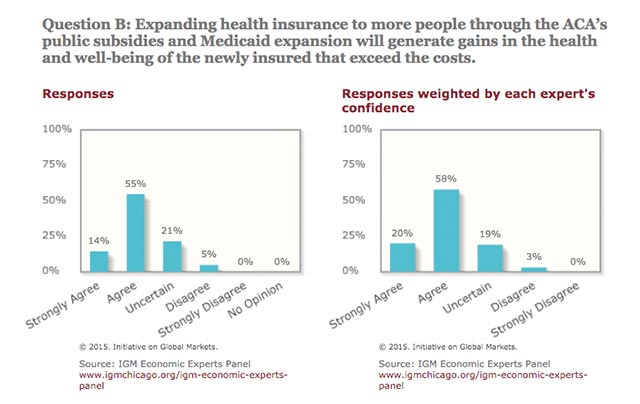
An Economist Debunks ‘Gone with the Wind’
Chicago Booth’s Richard Hornbeck discusses research that finds emancipation created huge economic value.
An Economist Debunks ‘Gone with the Wind’Since the Affordable Care Act was signed into law in the United States in March 2010, it has withstood two challenges in the US Supreme Court and more than 60 attempts to repeal it in Congress. But how the legislation will affect America’s economy and the overall health of its citizens is still an open question.
The Initiative on Global Markets at Chicago Booth ran an Economic Experts Panel poll that addresses the ACA’s public subsidies and Medicaid expansion in terms of their effect on both total health spending in the economy and the well-being of the newly insured.
Do they think subsidies will reduce total health-care spending in the economy? Fifty-two percent of the panel says no—and most of the rest answered that they were uncertain. Do they think gains in the health and well-being of the newly insured exceed the costs? Nearly 70 percent of the panel says yes.

Larry Samuelson of Yale agreed that health-care spending would slow down: “Health insurance should provide care more efficiently than the current lack of insurance coupled with reliance on emergency services.”
Richard Schmalensee of MIT, by contrast, disagreed: “A big switch from reliance on emergency rooms to prevention could do this, but this does not seem likely.”
And David Cutler of Harvard was uncertain: “The timing is really important here. Long term can be very different from short term; costs more likely to fall in the long term.”

Darrell Duffie of Stanford agreed that the health gains will outweigh the costs: “The resulting gains include better health for the newly covered, and fewer preventable high-cost diseases to treat. The total should be enough.”
Steve Kaplan of Chicago Booth disagreed: “The experiments in Oregon suggest the benefits are modest and the costs are higher. But, there is still much uncertainty.”

Chicago Booth’s Richard Hornbeck discusses research that finds emancipation created huge economic value.
An Economist Debunks ‘Gone with the Wind’
Research examines two different types of labor-market policy designed to help displaced workers pivot to new jobs.
How Should We Help Workers Exposed to Offshoring?
A study looks at how parents react when they learn assistance for their children will end.
Do Government Benefits Really Have a ‘Discouragement Effect’?Your Privacy
We want to demonstrate our commitment to your privacy. Please review Chicago Booth's privacy notice, which provides information explaining how and why we collect particular information when you visit our website.